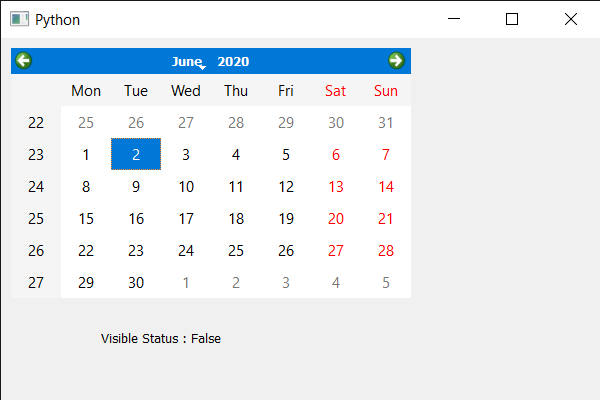En este artículo veremos cómo podemos obtener el estado de propiedad visible de QCalendarWidget, al hacer que la propiedad visible sea Falso podemos hacerlo invisible. Podemos hacerlo visible con la ayuda del showmétodo, pero este método no lo hará invisible, por lo tanto, usamos la propiedad visible que puede hacer ambas cosas. Podemos establecer el estado de propiedad visible con la ayuda del setVisiblemétodo.
Para hacer esto, usaremos
isVisibleel método con el objeto QCalendarWidget.Sintaxis: calendar.isVisible()
Argumento: no requiere argumento
Return : Devuelve bool
A continuación se muestra la implementación.
# importing libraries
from PyQt5.QtWidgets import *
from PyQt5 import QtCore, QtGui
from PyQt5.QtGui import *
from PyQt5.QtCore import *
import sys
class Window(QMainWindow):
def __init__(self):
super().__init__()
# setting title
self.setWindowTitle("Python ")
# setting geometry
self.setGeometry(100, 100, 600, 400)
# calling method
self.UiComponents()
# showing all the widgets
self.show()
# method for components
def UiComponents(self):
# creating a QCalendarWidget object
calender = QCalendarWidget(self)
# setting geometry to the calendar
calender.setGeometry(10, 10, 400, 250)
# setting visible property
calender.setVisible(True)
# creating label
label = QLabel(self)
# setting geometry to the label
label.setGeometry(100, 270, 250, 60)
# making label multi line
label.setWordWrap(True)
# getting visible property status
value = calender.isVisible()
# setting text to the label
label.setText("Visible Status : " + str(value))
# create pyqt5 app
App = QApplication(sys.argv)
# create the instance of our Window
window = Window()
# start the app
sys.exit(App.exec())
Producción :
Publicación traducida automáticamente
Artículo escrito por rakshitarora y traducido por Barcelona Geeks. The original can be accessed here. Licence: CCBY-SA